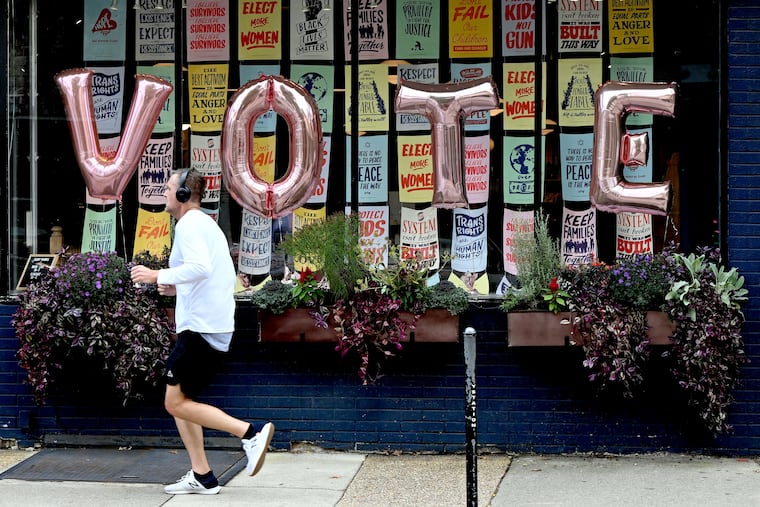Pa. residents got phony texts claiming they had voted already. Ignore them, officials say.
If “AllVote” sounds familiar, the name has been linked to other confusion-sowing text campaigns in the lead up to the election.

Reply STOP to unsubscribe from misinformation about the Nov. 5 general election.
If only it were that simple.
Thousands of Pennsylvania voters received a text message this weekend that falsely claimed that they had already voted in the Nov. 5 election.
“Records show you voted,” the text read, linking them to an official Pennsylvania website with information about polling places and early voting.
But the message did not come from an official government resource or a well-known get-out-the-vote advocacy group. Instead, it was signed by “AllVote,” a self-proclaimed voter-mobilization program that election officials have repeatedly flagged as a scam to be avoided and ignored.
If “AllVote” sounds familiar, the name has been linked to other confusion-sowing text campaigns in the lead-up to the election. Montgomery County officials in August warned voters about “AllVote.com” that was texting registered voters and falsely claiming that they were not registered to vote — part of a scam to “capture personal, sensitive information from voters in an attempt to exploit them later on,” election commissioners said.
Election officials in Arizona and North Carolina raised concerns about text campaigns from an organization with the same name in recent months.
On Monday, however, a representative from AllVote insisted that it was a misunderstanding.
Charlotte Clymer, a contracted spokesperson for AllVote, sent The Inquirer an apologetic statement, describing the texts as a well-intended reminder-turned-disastrous mistake, thanks to a typo committed by staffers.
“We are mortified by this mistake and the confusion it has caused,” the organization said in the statement.
The organization would not say how many voters were sent the erroneous text.
The original message was intended to inform Pennsylvania voters that they had cast ballots in 2022 and to direct them toward a verified link to explore their voting options. But “in 2022″ was left out of the script, which led to widespread confusion, the statement said.
“In the heat of the campaign season, workers working long hours simply made a copy-editing mistake,” the statement read.
A follow-up text was sent to voters who received the initial text message, informing them of the error. But those who replied “STOP” to the initial message — or marked the sender as spam — may not have received the follow-up, and the organization acknowledged the damage done.
“We deeply apologize for this error, which we understand caused significant confusion, especially amongst voters who have not voted yet but were told they had,” the organization said, vowing to implement an additional review process on future text alerts.
Clymer described AllVote as “funded by progressive donors aiming to increase voting participation” but declined to provide details about the group’s backers. A political action committee with that name was registered this year. Yet little public information is available about AllVote, and its website lists no founder or staffers.
Clymer said the organization does not disclose its backers for fear of being targeted by the far-right. She also said that election officials and news reports that issued statements characterizing their recent efforts as phishing scams were incorrect.
“The vast majority of our messages only include official .gov links,” Clymer said in an email. “We’ve seen negative stories from elections offices coming out, even when we are just sending people to their website. For good reason, election officials are reacting quickly, but unfortunately, they aren’t always verifying their suspicions before they publish a press release (or reaching out to us).”
The apparent mistake also appears to undermine the professed mission of the fledgling group. On its website, AllVote says its mission is to help “eliminate the uncertainty for voters by sending them direct information.”
“We take seriously the responsibility of providing correct information,” the website reads. “Some of our communications include information about whether a voter has cast their ballot — we take every step to ensure that this information is up-to-date and based on the freshest version of the voter file that excludes those who already voted.”
Generally, election officials advise voters to defer to messaging from the Pennsylvania Department of State or their local election board for trusted and accurate information. Philadelphia City Commissioner Lisa Deeley, one of Philadelphia’s three election commissioners, echoed this on Monday.
“Voters should be careful and not believe everything they read on Facebook, receive in the mail, or via text,” Deeley said. “As we get close to Election Day, make sure you are checking a trusted source for your election information. Voters can check their registration, mail ballot status, or find their polling place all from our website Vote.Phila.gov or by calling 215-686-VOTE.”
The Pennsylvania Department of State did not immediately respond to a request for comment. The Philadelphia District Attorney’s Office, which operates an election fraud task force every election season, received reports of the erroneous texts, but a spokesperson declined further comment.